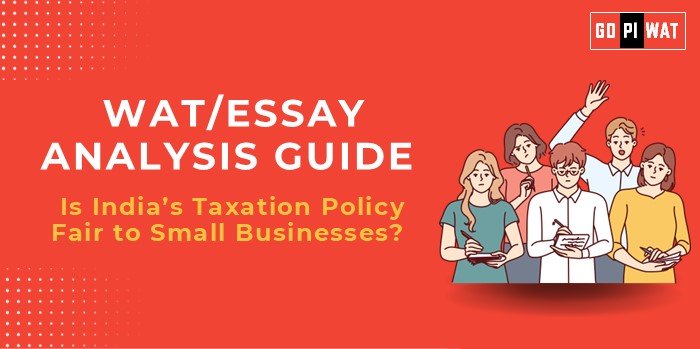📋 WAT/Essay Analysis Guide
📊 Is India’s Taxation Policy Fair to Small Businesses?
🌟 Understanding the Topic’s Importance
Taxation policies significantly impact the operational efficiency and growth potential of small businesses. In India, where MSMEs play a pivotal role in the economy, assessing the fairness of these policies is essential for fostering an inclusive business environment.
📝 Effective Planning and Writing
- ⏱️ Time Allocation:
- Reading & Planning: 5 minutes
- Writing: 20 minutes
- Review: 5 minutes
💡 Introduction Techniques for Essays
-
- Contrast Approach:
“While the Goods and Services Tax aimed to simplify India’s taxation landscape, small businesses continue to face challenges such as compliance costs and procedural complexities. This raises the question of whether the system is truly equitable for these enterprises.”
-
- Solution-Oriented Approach:
“Taxation policies are pivotal to the survival and growth of small businesses in India. While reforms like GST were introduced to simplify processes, further steps are needed to reduce compliance burdens and ensure a level playing field for small enterprises.”
🔍 Structuring the Essay Body
🏆 Achievements:
- 📈 Unified Tax Structure: GST replaced multiple indirect taxes, reducing administrative hurdles.
- 💻 Digital Compliance: Online filing and e-invoicing systems increased transparency.
- 🛡️ Exemptions: Turnover thresholds exempting businesses up to ₹40 lakh help micro-enterprises avoid compliance pressures.
⚠️ Challenges with Comparative Analysis:
- 💸 Compliance Costs: The cost of software and tax professionals remains high for small businesses.
- 📜 Complex Refund Processes: Invoicing mismatches and delayed GST refunds hurt cash flows.
- 🌏 Global Benchmarks: Countries like Singapore offer simpler GST structures and rebates for small businesses, reducing their tax burden.
🔮 Future Outlook:
- 📃 Simplify Filing Processes: Introducing single-step filing for smaller entities.
- 🤖 AI-Driven Compliance: Automated systems to assist with filings and reduce errors.
- 💡 Targeted Support: Expand tax credits and incentives for businesses adopting digital tools.
📄 Concluding Effectively
-
- Balanced Conclusion:
“India’s taxation policies, while progressive in intent, need further refinements to address the disproportionate compliance burden on small businesses. Ensuring fairness through targeted reforms will be crucial for the inclusive growth of this sector.”
-
- Future-Focused Conclusion:
“As India aspires to become a $5 trillion economy, empowering small businesses through fair and streamlined taxation policies will be pivotal. By adopting technology and reducing compliance barriers, India can create a robust environment for MSMEs to thrive.”
✨ Recommendations for Sustainable Progress
- 📃 Introduce Simplified Tax Systems: Single-page GST filings for small businesses.
- 🎓 Promote Financial Literacy: Subsidized training programs on compliance.
- ⚙️ Enhance Refund Processes: Use AI to streamline and expedite refund claims.
📝 Sample Short Essays (100 Words)
📌 Balanced Perspective:
“India’s taxation system, particularly GST, aimed to simplify compliance but presents mixed outcomes for small businesses. While turnover thresholds exempt micro-businesses, compliance costs and procedural complexities remain significant challenges. International benchmarks, like Singapore’s single-step filing system, offer insights for improvement. India must streamline refund processes and reduce costs to ensure the taxation system fosters equity for all businesses.”
📌 Solution-Oriented:
“The GST reform marked a significant milestone in unifying India’s taxation structure. However, the system needs further refinement to support small businesses better. Simplifying GST filings, introducing automated refund mechanisms, and offering targeted incentives for digital adoption can mitigate existing challenges. By focusing on fairness and efficiency, India can create a thriving ecosystem for small enterprises, driving economic growth.”
📌 Global Comparison:
“India’s taxation policies show promise but fall short in fairness for small enterprises compared to countries like Singapore and China. Simplified filing systems and tax incentives abroad reduce compliance burdens, allowing small businesses to grow competitively. India can draw from these models to create a taxation framework that balances revenue collection with the growth needs of small businesses.”


